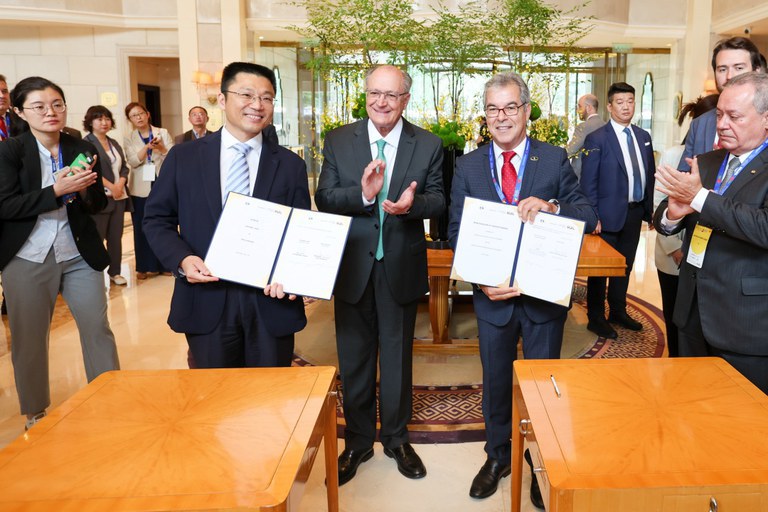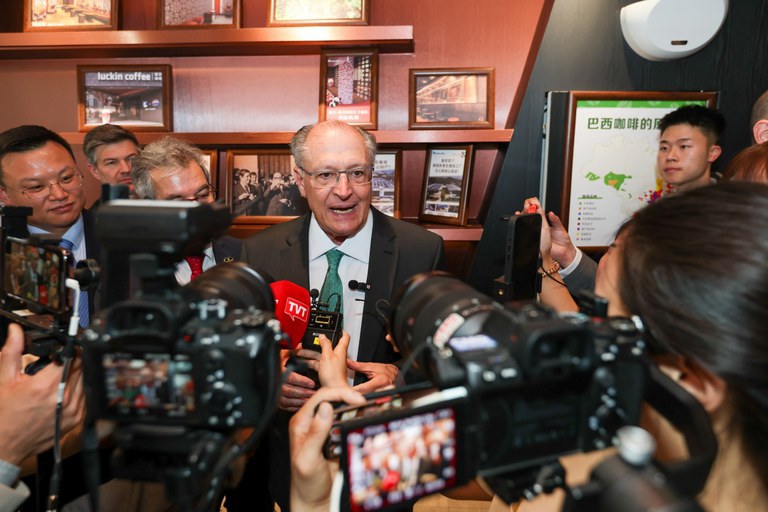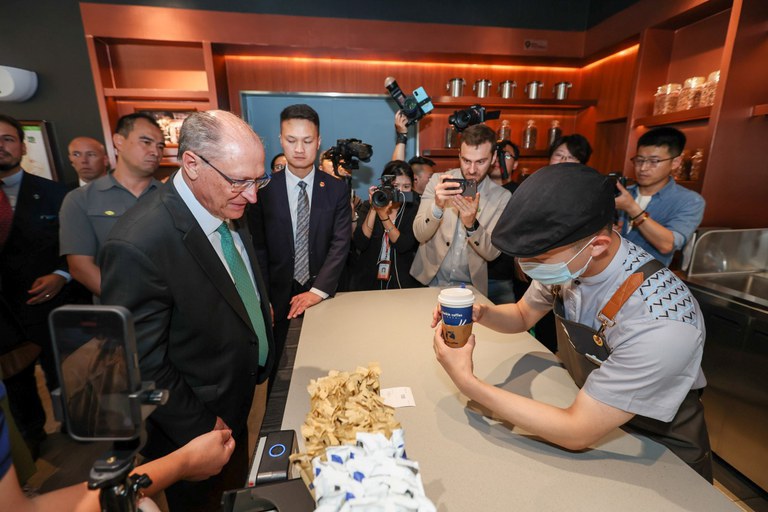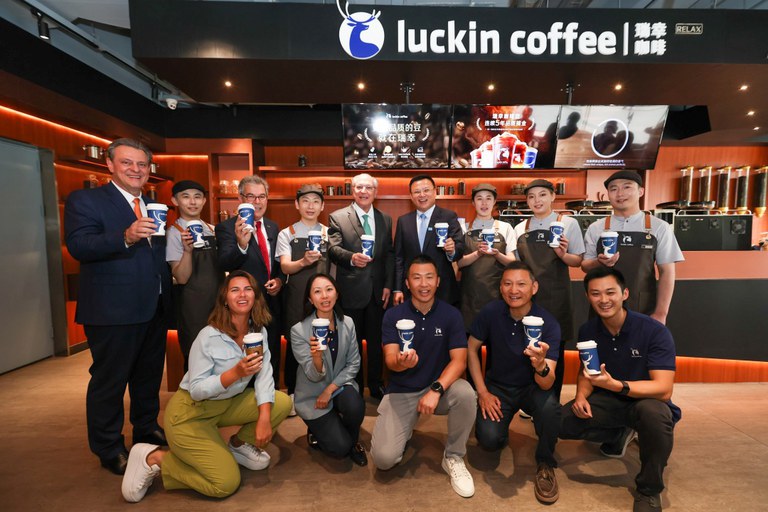Notícias
FOREIGN AFFAIRS
VP signs agreements to promote Brazilian coffee in China’s largest cafe chain
On the second day of the official mission to China, Brazilian Vice President and Minister of Development, Industry, Trade, and Services (MDIC), Geraldo Alckmin, signed memorandums of understanding (MOU) to promote Brazilian coffee in China’s largest chain of coffee-shops, Luckin Coffee, and to create an innovation hub in Shanghai. The Brazilian Trade and Investment Promotion Agency (Apex-Brasil) organized the initiatives.
In 2022, Brazil exported USD 80 million worth of coffee, a figure that nearly quadrupled to USD 280 million the following year. The new contract with Luckin Coffee alone represents half a million dollars in exports, demonstrating that Brazil — the world's largest coffee producer and exporter — is successfully accessing new markets”
Geraldo Alckmin, Brazil’s Vice President
With over 16,000 shops in China, the Luckin Coffee chain is the country's largest importer of Brazilian coffee. Through this new partnership, Luckin committed to promote and sell Brazilian coffee to clients and partners, including the acquisition of approximately 120,000 tons of Brazilian coffee, valued at an estimated USD 500 million.
“In 2022, Brazil exported USD 80 million in coffee, a figure that nearly quadrupled to USD 280 million the following year. This new contract with Luckin Coffee alone represents half a million dollars in exports, showing that Brazil — the world's largest coffee producer and exporter — is successfully accessing new markets,” celebrated the Brazilian Vice President.
ApexBrasil President Jorge Viana said this initiative exemplifies the agency's export promotion programs, such as ExportaMaisBrasil, ExportaMaisAmazônia and ExportaMaisNordeste. Brazilian Agriculture Minister Carlos Fávaro noted that the country's coffee production is constantly evolving with a focus on sustainability. Alckmin highlighted that coffee is a viable alternative for small farmers, as it does not require too much land. "Coffee is a good income-generation option for family farming and organic producers. It is viable because it combines economic and social relevance," said the vice president.
Speaking of sustainability, social inclusion and job creation, Luckin Coffee CEO Jinyi Guo said that over half of the chain's employees are women under the age of 25.
EXCHANGE – ApexBrasil will provide information and branding materials for promotional campaigns in China. It will also organize informational exchange programs focused on Brazilian coffee, including visits by Luckin Coffee representatives to coffee farms in Brazil. Additionally, the two organizations are planning a promotional event to increase the visibility of Brazilian coffee in China as part of celebrations for the 50th anniversary of bilateral diplomatic relations.
INNOVATION HUB — This week's signings included the creation of Casa Brasil, a hub for Sino-Brazilian trade and investment. Located in Shanghai's Yangpu district, home to technology companies such as TikTok, this partnership aims to facilitate the internationalization of Brazilian companies. ApexBrasil seeks to leverage this collaboration to enhance the presence of Brazilian businesses in the Chinese market.
“Casa Brasil aims to become the main destination for Chinese companies to launch manufacturing partnerships with Brazilian companies,” stated the ApexBrasil president. According to Viana, the inauguration is expected to occur this year, with the support of the Brazilian private sector.
The Yangpu Mayor, Zhou Haiying, noted that June 5, the date of the MOU signing, is celebrated as Chinese Seeding Day, traditionally considered a favorable day for sowing crops. "I hope that today’s event will be remembered as the day we sowed seeds of friendship between Brazil and China, and that the fruits of this partnership will be beautiful."
In addition to the MOUs signed by the Brazilian Vice President, other partnerships involving Brazilian and Chinese entities were signed:
● Action Plan between the Brazilian and Chinese sections of the Brazil-China Business Council. This plan sets working goals and joint efforts to promote friendly and pragmatic cooperation between the two countries to contribute to the stable and sustainable development of the Chinese-Brazilian economy.
● MoU between ApexBrasil and the Ministry of Entrepreneurship, Micro and Small Businesses, aimed at enhancing the qualification and promotion of Brazilian micro- and small-scale businesses and artisans internationally. The MOU encompasses e-commerce and identifies China as one of its primary target markets.
● MoU between Brazil’s National Confederation of Industry (Confederação Nacional da Indústria - CNI), Zhejiang University Science Park Development and ZIBS Latin America Center to facilitate the expansion of Brazilian companies into the Chinese market and provide assistance in establishing offshore incubators in Brazil. The MOU also establishes a high-tech “CEO Club.”
● MoU between Brazil’s CNI and the Zhejiang University International Business School to train executives in strategic industrial sectors and promote innovation.
● MoU between Brazil’s CNI and the China Association of Inventions, aimed at establishing a BRICS+ Alliance for Science, Technology and Innovation. The agreement encompasses cooperation projects and mobility programs focused on technological innovation, potentially including calls for proposals for innovation projects.
● MoU between Brazil’s CNI and the International Alliance of Skills Development, aimed at establishing a Reference Center for Future Careers and implementing an exchange program focused on technology and training in technical competencies.
● MoU between Sete Partners and Sinomach, aimed at developing a joint origination platform to finance national production with purchase guarantees, thereby expanding the negotiation of Brazilian agricultural commodities in China.
● MoU between Sete Partners and Shanghai Spacecom Satellite Technology (SSST) to establish a company branch in Brazil, thereby promoting investments in telecom infrastructure such as data centers and earth-space connections.
● MoU between Sete Partners and China Energy Engineering Group (CEE), for the establishment of a representative office in Brazil. The aim is to secure investments for the development and distribution of Chinese electrical systems in Brazil, thereby enhancing local production of electric equipment and investing in the production of natural gas, solar, and wind energy.



